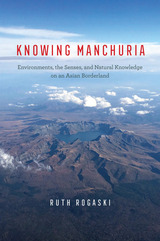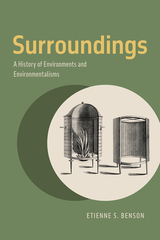3 books about Environments

Epidemics, Empire, and Environments
Cholera in Madras and Quebec City, 1818–1910
Michael Zeheter
University of Pittsburgh Press, 2015
Throughout the nineteenth century, cholera was a global scourge against human populations. Practitioners had little success in mitigating the symptoms of the disease, and its causes were bitterly disputed. What experts did agree on was that the environment played a crucial role in the sites where outbreaks occurred. In this book, Michael Zeheter offers a probing case study of the environmental changes made to fight cholera in two markedly different British colonies: Madras in India and Quebec City in Canada.
The colonial state in Quebec aimed to emulate British precedent and develop similar institutions that allowed authorities to prevent cholera by imposing quarantines and controlling the disease through comprehensive change to the urban environment and sanitary improvements. In Madras, however, the provincial government sought to exploit the colony for profit and was reluctant to commit its resources to measures against cholera that would alienate the city’s inhabitants. It was only in 1857, after concern rose in Britain over the health of its troops in India, that a civilizing mission of sanitary improvement was begun. As Zeheter shows, complex political and economic factors came to bear on the reshaping of each colony's environment and the urgency placed on disease control.
The colonial state in Quebec aimed to emulate British precedent and develop similar institutions that allowed authorities to prevent cholera by imposing quarantines and controlling the disease through comprehensive change to the urban environment and sanitary improvements. In Madras, however, the provincial government sought to exploit the colony for profit and was reluctant to commit its resources to measures against cholera that would alienate the city’s inhabitants. It was only in 1857, after concern rose in Britain over the health of its troops in India, that a civilizing mission of sanitary improvement was begun. As Zeheter shows, complex political and economic factors came to bear on the reshaping of each colony's environment and the urgency placed on disease control.
[more]

Knowing Manchuria
Environments, the Senses, and Natural Knowledge on an Asian Borderland
Ruth Rogaski
University of Chicago Press, 2022
Making sense of nature in one of the world’s most contested borderlands.
According to Chinese government reports, hundreds of plague-infected rodents fell from the skies over Gannan county on an April night in 1952. Chinese scientists determined that these flying voles were not native to the region, but were vectors of germ warfare, dispatched over the border by agents of imperialism. Mastery of biology had become a way to claim political mastery over a remote frontier. Beginning with this bizarre incident from the Korean War, Knowing Manchuria places the creation of knowledge about nature at the center of our understanding of a little-known but historically important Asian landscape.
At the intersection of China, Russia, Korea, and Mongolia, Manchuria is known as a site of war and environmental extremes, where projects of political control intersected with projects designed to make sense of Manchuria’s multiple environments. Covering more than 500,000 square miles, Manchuria’s landscapes include temperate rainforests, deserts, prairies, cultivated plains, wetlands, and Siberian taiga. With analysis spanning the seventeenth century to the present day, Ruth Rogaski reveals how an array of historical actors—Chinese poets, Manchu shamans, Russian botanists, Korean mathematicians, Japanese bacteriologists, American paleontologists, and indigenous hunters—made sense of the Manchurian frontier. She uncovers how natural knowledge, and thus the nature of Manchuria itself, changed over time, from a sacred “land where the dragon arose” to a global epicenter of contagious disease; from a tragic “wasteland” to an abundant granary that nurtured the hope of a nation.
According to Chinese government reports, hundreds of plague-infected rodents fell from the skies over Gannan county on an April night in 1952. Chinese scientists determined that these flying voles were not native to the region, but were vectors of germ warfare, dispatched over the border by agents of imperialism. Mastery of biology had become a way to claim political mastery over a remote frontier. Beginning with this bizarre incident from the Korean War, Knowing Manchuria places the creation of knowledge about nature at the center of our understanding of a little-known but historically important Asian landscape.
At the intersection of China, Russia, Korea, and Mongolia, Manchuria is known as a site of war and environmental extremes, where projects of political control intersected with projects designed to make sense of Manchuria’s multiple environments. Covering more than 500,000 square miles, Manchuria’s landscapes include temperate rainforests, deserts, prairies, cultivated plains, wetlands, and Siberian taiga. With analysis spanning the seventeenth century to the present day, Ruth Rogaski reveals how an array of historical actors—Chinese poets, Manchu shamans, Russian botanists, Korean mathematicians, Japanese bacteriologists, American paleontologists, and indigenous hunters—made sense of the Manchurian frontier. She uncovers how natural knowledge, and thus the nature of Manchuria itself, changed over time, from a sacred “land where the dragon arose” to a global epicenter of contagious disease; from a tragic “wasteland” to an abundant granary that nurtured the hope of a nation.
[more]

Surroundings
A History of Environments and Environmentalisms
Etienne S. Benson
University of Chicago Press, 2020
Given the ubiquity of environmental rhetoric in the modern world, it’s easy to think that the meaning of the terms environment and environmentalism are and always have been self-evident. But in Surroundings, we learn that the environmental past is much more complex than it seems at first glance. In this wide-ranging history of the concept, Etienne S. Benson uncovers the diversity of forms that environmentalism has taken over the last two centuries and opens our eyes to the promising new varieties of environmentalism that are emerging today.
Through a series of richly contextualized case studies, Benson shows us how and why particular groups of people—from naturalists in Napoleonic France in the 1790s to global climate change activists today—adopted the concept of environment and adapted it to their specific needs and challenges. Bold and deeply researched, Surroundings challenges much of what we think we know about what an environment is, why we should care about it, and how we can protect it.
Through a series of richly contextualized case studies, Benson shows us how and why particular groups of people—from naturalists in Napoleonic France in the 1790s to global climate change activists today—adopted the concept of environment and adapted it to their specific needs and challenges. Bold and deeply researched, Surroundings challenges much of what we think we know about what an environment is, why we should care about it, and how we can protect it.
[more]
READERS
Browse our collection.
PUBLISHERS
See BiblioVault's publisher services.
STUDENT SERVICES
Files for college accessibility offices.
UChicago Accessibility Resources
home | accessibility | search | about | contact us
BiblioVault ® 2001 - 2024
The University of Chicago Press









